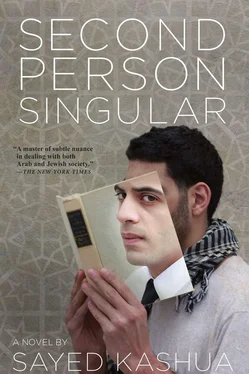The immigrants from the north were largely responsible for the rise in prices. To the locals, the immigrants were rich, exploitable foreigners who could be made to pay the kind of prices they had previously been able to extract only from Jews. And the influx of people with money brought inflation to more than just the real estate market: meat, milk, and vegetables became more expensive and the neighborhood bakery had adopted two sets of prices — one for the locals and one for the foreigners. Price hikes aside, the locals liked the immigrants. They knew that the immigrants were far better than the rest of the riffraff that were apartment hunting around there — Palestinian collaborators who had been relocated to east Jerusalem by the Israeli security services. The collaborators had money but, as far as the locals were concerned, they were traitors. The Arab-Israeli immigrants, on the other hand, were well-educated and politically savvy and the locals respected the achievements of their brethren from the Galilee, hoping that their academic and economic success would trickle down to the rest of the village. The trouble was that the sudden rise in real estate values sparked feuds within clans and families, with cousins and brothers quarreling over every square inch of land.
“What was it all about?” the gynecologist asked, looking at the lawyer. “Or are you going to tell me they didn’t come to you with their problems?” he added, chuckling.
The lawyer smiled and nodded his head in affirmation, but it was clear he had no interest in discussing what had happened. The lawyer’s wife, sensing this, got up from her chair and announced that it was time for the next course. The lawyer rose and began collecting the guests’ sushi plates. He poured what remained of the white and red wines into the appropriate glasses and brought new bottles to the table. His wife served an arugula salad with a balsamic dressing, pumpkin ravioli, and entrecôte steaks in a cream and mushroom sauce, along with a potato pastry.
“So you’re not telling?” the gynecologist tried again. “Come on, these are my neighbors, don’t I deserve to know why my neighbors are shooting each other?”
The lawyer offered him another smile and tried to treat his demands as a joke. “No, not a word, Samir, especially because I see how badly you want to know.”
The lawyer’s response drew a few laughs. Nabil, the civil lawyer, felt an allegiance toward his colleague and said, “You’re right, let him stew in his own curiosity. Don’t say another word.”
Samir, of course, was correct. Both sides had turned to the lawyer for representation. He, though, had to pick one party, and he picked the stronger one, not out of greed but because, on the contrary, he knew he would have a better chance of pushing the stronger side toward reconciliation. At the end of the day, it was his neighborhood, too, and if the two biggest clans became locked into a blood feud his life would be affected.
The situation had begun with a fight at the local high school. One student, a member of the stronger clan, the one the lawyer had decided to represent, supposedly used his cell phone to snap a picture of one of the girls in the class. When word of this treachery reached her male cousins, who went to the same school, they assaulted the alleged cameraman, and sent him home bleeding and bruised. The parents and brothers of the kid, who swore he had never taken any such picture, set out for revenge. They mobbed the house of the boys who had attacked their kin, pelted it with rocks, and demanded that the perpetrators come out and show their faces. The head of the household had drawn an unlicensed weapon and begun shooting in the air, summoning, with great alacrity, the police and border police, who do not tolerate armed feuds in the eastern part of the city. The security forces dispersed the mob and arrested five family members from each clan. The gun, however, was not found.
The lawyer chose to represent the stronger clan, hoping to reach a compromise out of court. If he could get them to agree, there was no doubt that the weaker one would consent, too. In the meantime, he spoke to the head of the household of the stronger clan and convinced him that the feud was not worth the arrest of the youths and the damage that could be done by dragging this matter through the Israeli courts. The patriarch agreed to try and settle the problem with the help of the village mukhtars and peacemakers. “But only on one condition,” he said to the lawyer, “that the head of the other family comes and personally asks for my forgiveness.” The lawyer nodded and immediately sent Samah’s father, the Fatah official, to go and make peace between the two hawks.
“The steaks are delicious,” Faten said, and her husband, Anton, agreed.
“Everything is excellent,” Nabil said to the lawyer’s wife. “You were blessed with hands of gold.”
Only Samir and his wife were silent. “What’s wrong, Samir,” a chuckling Nabil asked the gynecologist. “The food isn’t good enough for you?”
“I won’t pay her any compliments until her husband tells me why there were people shooting guns right outside my house,” he said, laughing, and everyone understood that the matter of the gunfire in the neighborhood had been brought to a close.
DISCUSSION
Tarik snorted cigarette smoke out of his nose and chuckled when he learned from the lawyer that they were about to join a salon discussion on a predetermined topic. “Are you kidding me?” he asked.
“Relax,” the lawyer said, “there’ll be exactly five minutes of discussion before the conversation goes off on a tangent.”
“Well, what’s the discussion supposed to be about?” Tarik asked.
“You think I know?” the lawyer said, and Tarik covered his mouth so that his laughter wouldn’t carry from the office downstairs to the guests seated upstairs in the living room.
“What’s going on,” Samir’s voice boomed, “you still smoking down there? We’ve got important matters to discuss up here.”
The lawyer put his cigarette out in the ashtray and Tarik prepared to do the same but the lawyer signaled to him to take his time. Tarik took several long drags as the lawyer ripped open his gift-wrapped book. “ The Kreutzer Sonata? ” Tarik read, mispronouncing the name. “You know what, I’m really jealous that you can find time to read.”
“I don’t,” the lawyer said, yearning to see his guests filing out of his house.
Faten, the accountant’s wife who was also an assistant professor at the teachers’ college, sat on a separate couch, poised to lead the discussion.
“I want to begin by wishing everyone a good evening,” she said. “We’re so happy you’re all here and so glad to finally meet. .” and the lawyer’s wife stepped in, “Tarik.”
“Yes, of course, Tarik, sorry,” she said. “Our topic tonight is nationalist education and the absence of a Palestinian narrative within the Israeli ministry of education’s curricula for the Arab citizens of Israel.”
The lawyer recalled that this was what they had agreed to discuss while sitting at the last meeting, at the gynecologist and his wife’s house. It also happened to be the topic of Faten’s PhD thesis at Hebrew University, where she had been studying for quite some time now.
For many long minutes Faten relayed the findings of her research and compared the ministry’s guidelines for Jewish and Arab elementary school children in the following subjects: homeland studies, geography, history, and civics. She spoke of methodology, of ideology, and of her work within the ministry, where, she explained, the collective history of the Arab citizens of this state was erased, the Palestinian narrative was trampled, and the Arab students were force-fed the Zionist version of events. The other people present had very little to add. They conveyed their agreement with silent nods. She carried on, speaking about the intentional blurring of identity and the cultural, social, and moral crisis within the Arab student body — a crisis rooted in the tireless attempts to strip the Arab citizens of Israel of their true sense of national belonging.
Читать дальше












